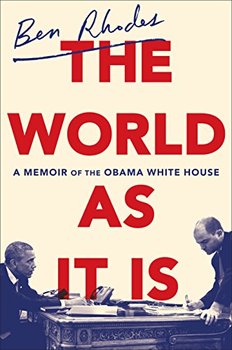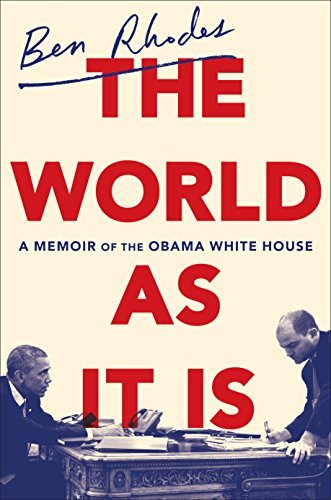
I rarely read political memoirs, because so often they’re one-sidedly partisan and self-serving. They tend to lack any sense of balance. For example, though I didn’t read Hillary Clinton’s book about the 2016 election, I saw enough reviews to know that its primary purpose was to deflect blame for her defeat entirely onto other people, when in fact she herself contributed to the loss in several ways. Similarly, I have little hope for most of the dozens of tell-all books that former Obama aides are now turning out. But, judging from the reviews, the new Ben Rhodes White House memoir seemed different. It is.
Estimated reading time: 5 minutes
In The World As It Is, one of Barack Obama’s key White House aides tells the story of his experience in the 2008 election campaign, followed by eight years involved in the Administration’s foreign policy work. In Washington, Rhodes “had two formal jobs—one as the deputy director of White House speechwriting, and one as the senior director for speechwriting for the National Security Council.”
This post was updated on May 5, 2023.
The World As It Is: A Memoir of the Obama White House by Ben Rhodes (2018) 428 pages ★★★★★
He was responsible for writing some of Obama’s most memorable public statements. And, from his position in the National Security Council, Rhodes gained a front-row seat at several of the President’s most important foreign policy initiatives, such as the killing of Osama bin Laden and the Iran nuclear arms agreement. In one crucial area his work was pivotal: he took the lead in negotiating the opening to Cuba. Eventually, he became “the one American official who could somehow be on the dais at Fidel Castro’s funeral.”
A White House memoir by the Right wing’s whipping-boy
If you got your perspective on the news during Obama’s two terms from Fox, Breitbart, or right-wing talk radio, you’ll instantly recognize Ben Rhodes’ name. He became one of their favorite whipping-boys. As Deputy Director of the National Security Council for Communications, he was a familiar figure in the media. Republicans in Congress demonized him. Again and again, they held him responsible for a long list of invented sins connected to the trumped-up Benghazi investigations, the agreement with Iran, and the Cuban initiative. Given the chance, no doubt they’ll dismiss The World As It Is out of hand.
Rhodes reflects on the experience of being the target of conspiracy-mongers and politicians with no regard for the truth: “It was like you inhabited two parallel lives—one that made you who you were, and the other that was consuming that person, and transforming you into someone else.” That’s about as close as Rhodes ever gets to hyperbole.
Rhodes is a skilled writer
Rhodes is a skilled writer. The book is simply structured along chronological lines. His prose flows smoothly, and he provides just enough local color and personal detail to keep his account engaging. He is occasionally critical of others in the Administration but never nasty; almost everywhere, his obvious respect for the men and women he worked with comes through clearly. Obviously, too, he is an agile thinker. The conversations he reports between him and the President suggest not just close rapport but an intellectual partnership that few people could manage. You only have to read Obama’s own books to understand how brilliant he is. Apparently, Rhodes was able to keep up with the man. Their exchanges, and Rhodes’ reflections on the 2016 election and the closing days of the Obama Administration in the final chapter, are particularly insightful and moving.
The Ben Rhodes White House memoir reflects Barack Obama’s own perspective
From an historical perspective, what stands out in this book is Rhodes’ perspective on the events he witnessed: the ill-fated Arab Spring; the bombing of Libya; the negotiation of the Paris climate change agreement; the Bin Laden killing; the protracted process that preceded the Iran agreement; the debate over taking military action in Syria; the opening to Cuba; and the slowly dawning understanding of just how extensively the Russians had intervened in the 2016 election. This is a man who had a front-row seat on some of the most consequential events of our time. His account of the controversy over Obama’s decision not to bomb Syria is especially telling: “Syria looked more and more like a moral morass—a place where our inaction was a tragedy, and our intervention would only compound the tragedy.” This, of course, was very similar to Obama’s own perspective.
Perspective from another review
Rhodes’ book has been widely reviewed, and at this writing it has been on the national bestseller lists for several weeks. The best review I’ve read is Peter Schjeldahl’s in The New Yorker (June 18, 2018). Schjeldahl focuses on the author’s evolution “from liberal idealism to a chastened appreciation of how American power can be more wisely harnessed to limited ends.” In other words, Rhodes, who began work for Obama at the age of twenty-nine, absorbed Obama’s worldview in the ten years he spent working closely with the man. Is that surprising?
For related reading
For a review of the superb memoir by Ben Rhodes’ boss, A Promised Land, see Barack Obama’s memoir is a literary tour de force.
Previously, I reviewed New Yorker editor David Remnick’s book about Obama, The Bridge, at Historical perspective on the surprising rise of Barack Obama. For more great reading on American history, see my post, Top 10 nonfiction books about politics.
You might also enjoy Great biographies I’ve reviewed: my 10 favorites.
This book is one of Two dozen excellent memoirs. For contrast, you might also take a look at the reviews I’ve written about books on Donald Trump’s presidency: 15 books about Donald Trump and his impact on American democracy.
And you can always find my most popular reviews, and the most recent ones, on the Home Page.


























